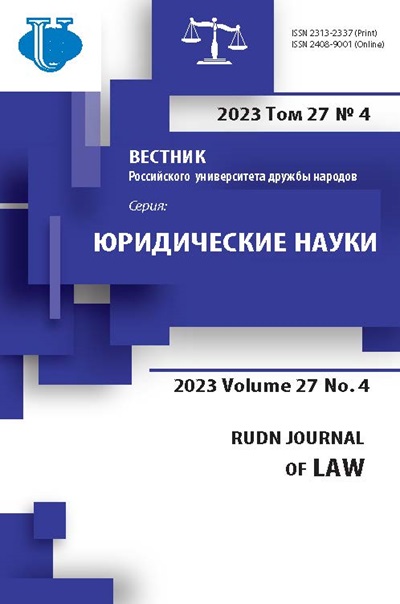Saving the population in the paradigm of state legal sovereignty: norms, deviations, challenges, solutions
- Authors: Zhukov V.I.1
-
Affiliations:
- Institute of State and Law of the Russian Academy of Sciences
- Issue: Vol 27, No 4 (2023)
- Pages: 837-858
- Section: STATE AND LAW IN CONTEMPORARY WORLD
- URL: https://journals.rudn.ru/law/article/view/36890
- DOI: https://doi.org/10.22363/2313-2337-2023-27-4-837-858
- EDN: https://elibrary.ru/FODKRH
- ID: 36890
Cite item
Full Text
Abstract
The study examines the content of demographic policy, the impact of the state of the population on ensuring state and legal sovereignty, reveals the role of such factors as natural population growth, its quantitative and qualitative characteristics, the country's ability to strengthen national cohesion and maintain independence in the conditions of aggravating interstate relations and the beginning of digitalization era. Russia's policy of reviving competitiveness and influencing the political world order relies not only on diplomatic, but also on other components of state sovereignty, which can be qualified as territorial, industrial, technological, legal, educational, cultural, informational, as well as other components, among which demographic sovereignty plays an important role. It is ensured by a strong social policy in the field of population conservation, its quantitative and qualitative condition, as well as responsible regulation of migration processes.
About the authors
Vasily I. Zhukov
Institute of State and Law of the Russian Academy of Sciences
Author for correspondence.
Email: vigs1947@mail.ru
SPIN-code: 7093-4933
Academician of the Russian Academy of Sciences, Doctor of Historical Sciences, Honored Scientist of the Russian Federation, Chief Researcher, Department of Legal Philosophy, Legal Theory and Legal History 10 Znamenka str., Moscow, 119019, Russian Federation
References
- Hegel, G.W.F. (1934) Philosophy of law. Essays. In 14 vols. Vol. 8th. Moscow.-Leningrad, Sotsekgiz Publ. (in Russian).
- Kokoshin, A.A. (2006) Real sovereignty in the modern world political system. Ed. 3rd, expand. and add. Moscow, Europe Publ. (In Russian).
- Levin, I.D. (2003) Sovereignty. Saint Petersburg, Legal Center Press Publ. (in Russian).
- Lokosov, V.V. (2022) Sociology of radical change: transformation of Russian society in 1987-2020. Monograph. Moscow, FNISC RAS. (in Russian).
- Manelis, B.L. (1964) The problem of sovereignty and its significance in modern conditions. Tashkent, Publishing House “Nauka” of the Uzbek SSR. (in Russian).
- Rousseau, J-J. (1938) On the social contract or principles of political law. Moscow, Sotsekgiz Publ. (in Russian).
- Rattur, M.V. (2012) Retrospective analysis of the priorities of state management of social protection of children in Russia. Problem analysis and public management design. 5(1), 111-122. (in Russian).
- Rattur, M.V. (2010) The role of youth value systems in the formation of the ideals of Russian society: socio-historical aspect. Social policy and sociology. 12(66), 129-141. (in Russian).
- Ryazantsev, S.V. (2021) Migration in Eurasia before and during the COVID-19 pandemic: trends, consequences, migration policy: monograph. Moskow, Economic Education Publ. (in Russian).
- Savenkov, A.N. & Zhukov, V.I. (2018) Sociology of legal deviations and social addictions: monograph. Moscow, Institute of State and Law of the Russian Academy of Sciences. (in Russian).
- Shutov, A.D. (2008) Russia in the millstones of history. Moscow, Veche Publ. (in Russian).
- Zhukov, V.I. (2010) Demographic potential of Russia. Moscow, Publishing house RGSU. (in Russian).
- Zhukov, V.I. (2012) Social development of Russia: historical and sociological comparative studies. In 3 Vols. Vol. 2. Moscow, Publishing house RGSU. (in Russian).
- Zhukov, V.I. (2017) Socio-demographic NABAT: monograph. Moscow, VIPO Publ. (in Russian).
- Zhukov, V.I. (2022) Russian civilization: historical and legal analysis of the phenomenon: monograph. In 2 Vols. Moscow, RITM Publ. (in Russian).
Supplementary files















